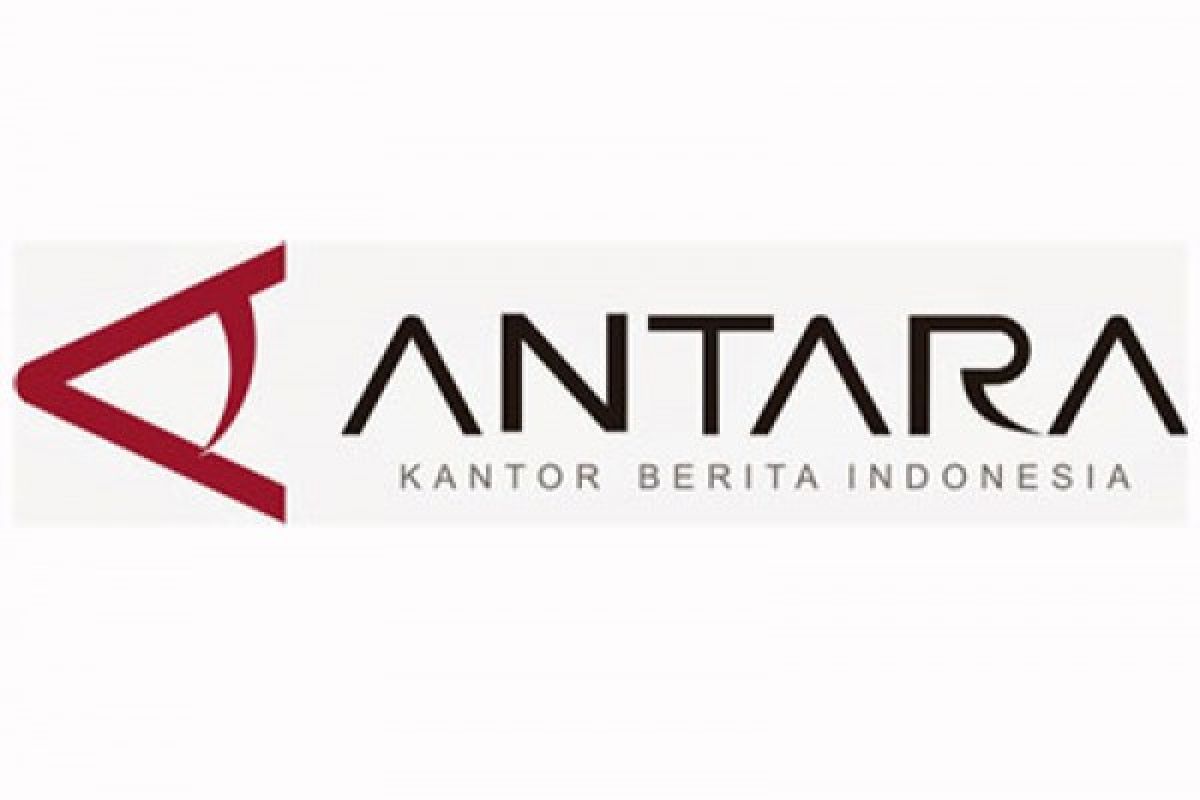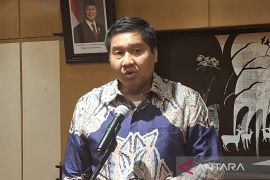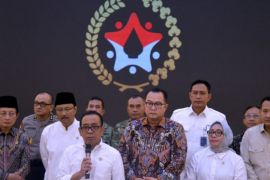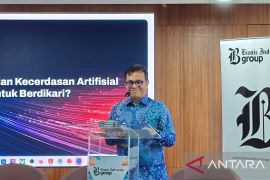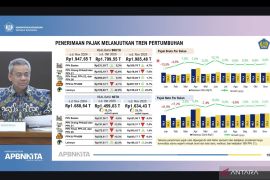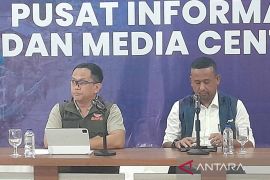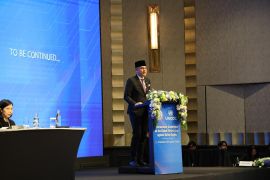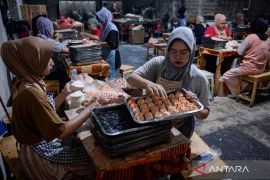The post-truth phenomenon has not only become a threat to democracy, but also to civil freedom.Jakarta (ANTARA News) - Just two days after President Joko Widodo on Monday, January 8, in Kupang, East Nusa Tenggara, reminded all elements of the community to avoid negative use of social media to slander one another, on Wednesday, January 10, the country`s 5th President Megawati Soekarnoputri stated a similar thing.
Megawati, who is also Chairman of the Indonesian Democratic Party of Struggle, touched on the use of social media during her speech on the commemoration of the Party`s 45th anniversary.
In length, she discussed the dangers of post-truth that has become an epidemic among the community, as a result of the rapid growth of communication and information technology through various social media platforms that are being used by the public, turning them into the people of information.
The citizens of the 21st century are people of information that had ease in access to the media, making it easy for them to shape their opinions. In this regard, aside to its positive impacts, numerous social media platforms had also lead to many negative excess.
Those negative excess include deception, canalization of deceit, premeditated and forged distortion that are being done to create rivalry and separation.
Much of its perpetrators are using false identities to slander, carry out blasphemy and character assassination, without any remorse or guilt.
International magazine `The Economist`, in its November 4 issue, released a report on the threats on democracy that come from social media.
The notion of post-truth had been chosen as the word of the year in 2016 by the Oxford dictionary, made by the Oxford University in the United Kingdom.
Post-truth is often used when one`s own belief and personal feelings towards a certain subject matter is more influential in shaping the public`s opinion, rather than objective facts.
To exemplify, Megawati took Brexit, which is the referendum of the British public that resulted in the decision for United Kingdom to leave the European Union, as well as the election of Donald Trump as President of the United States as case study.
The election of Donald Trump had shocked the world, as it appeared that Trump`s numerous lies and racism had no longer been seen as issues by his voters. To them, Trump is the best Presidential candidate.
Deputy of Political Communication and Information Dissemination of the Presidential Staff Offices Eko Sulistyo once wrote an article titled `Social Media and the Post-Truth Phenomenon`, in which he wrote that the post-truth era can be considered as a specific social shift that involves mainstream media and opinion shapers. Facts are competing with false information or hoax and lies to be believed by the public.
Mainstream media, that used to be one of the credible sources for accurate information, now has to face the ever thinning line between truth and lies, and between deceit, fiction and non-fiction.
The seizing of operators of hoax business and false news Saracen showed that the phenomenon of post-truth is also happening in Indonesia. As one of the countries with biggest percentage of internet users in the world, Indonesia has the potentials to be come the target for the phenomenon, for both economic or political interest purposes.
The post-truth phenomenon can also easily spread widely in Indonesia, due to four factors, one being the advances in information technology that is asymmetrical to the government`s and the public`s capacity to adapt. Secondly, there is political competition that seemed to be never-ending since the 2014 General Elections.
The third factor is the support, that is sustaining the phenomenon, from certain groups of the community on extreme ideologies that leaned against the five principles of the state.
Lastly, there is anxiety around the changes and improvements in the system that are being carried out by the government at the moment.
The rapid growth of information technology, as well as the internet, cannot be stopped. The government will continue its effort to find balance between the freedom of democracy in all matters around information and access to the internet.
Meanwhile, the post-truth phenomenon has not only become a threat to democracy, but also to civil freedom.
Governments and law enforcement officers are taking measures in response to the post-truth era. One of the strong approaches by the Indonesian government is shown when the phenomenon of post-truth is included in the category of hate speech, as stated in the Criminal Procedure Code (Articles 156-157).
Some other laws and regulations may also serve as a basis for criminalizing hate speech include the State Law Number 11 of 2008 on Information and Electronic Transactions, Law Number 40 of 2008 on the Elimination of Racial and Ethnic Discrimination, Law Number 7 of 2012 on the Handling of Social Conflict, and the Regulation of the National Police Chief Number 8 of 2013 on Technical Handling of Social Conflict.
Furthermore, the government had required every owner of a cellular phone number to re-register themselves using the Population Identity Number or NIK.
The cards are programmed to go automatically inactive after its registration processes are over in March. There are more than a hundred million users of cellular cards in Indonesia and the government is obligated to protect its citizens, as well as their unity, from hate speech and false information that could tear them apart.
The post-truth phenomenon gave a challenge to the government and the public, as social media can be used for positive activities when used wisely, but can also be the source to social problems.
Political Year
The government, through Minister of Home Affairs Tjahjo Kumolo and Minister of Communication and Informatics Rudiantara, along with the Election Commission and the and Election Supervisory Body are currently formulating their strategy to prevent black campaign and the impact of the spread of hate speech during the Regional Elections in 2018 and the General Election in 2019.
In the next month, the Commission and the Supervisory Body, along with the Ministry of Communication and Informatics will sign a Memorandum of Understanding that contains an agreement to create a balanced, attractive and creative campaign season.
Head of the Election Supervisory Board Abhan stated that the challenges that may occur along the way, in regard to black campaign in social media, is if political parties and election participants are not being transparent in registering their social media accounts used in the campaigns.
The Supervisory Body is also working with the National Police Force, specifically its Acts of Cyber Crime unit, to anticipate the spread of black campaign on social media.
"Black campaign counts as an election crime, and it is stated in the law. The Election Supervisory Body is anticipating its spread on social media by coordinating with the Police Force and the Election Commission, as we can follow up with the accounts that are registered in the Commission," he stated.
Referring to past experiences, there are normally only few social media accounts, belonged to election participants, that are officially registered to the Commission, while other unregistered accounts can possibly be exploited as a vehicle for the spread of black campaign, hate speech and false news.
In relation to that, Minister Rudiantara used the concept of content filtering for black campaign, as he had been using with other negative contents.
The President had also advised all parties not to conduct black campaign in the elections, in order to maintain the Indonesian democracy event that reflects polite characters.
Democracy in Indonesia should reflect the Indonesian character that is full of politeness, rather than slander and reproach.
Reported by Budi Setiawanto
(UU.KR-ARC/A/KR-BSR/A/H-YH)
Reporter: Budi Setiawanto/ Aria Cindyara
Editor: Heru Purwanto
Copyright © ANTARA 2018
